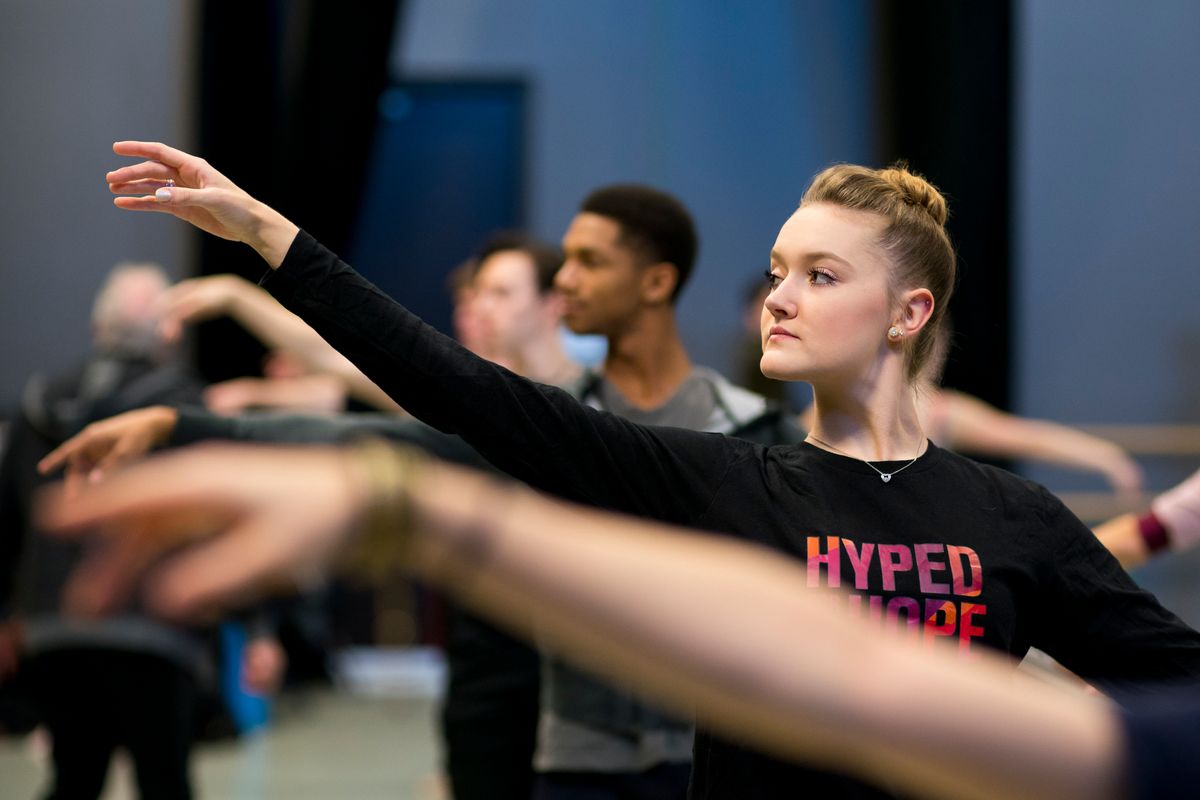Leveraging Your Summer Layoff: How to Make Your Company's Postseason Hiatus Work For You
For a new professional dancer, the concept of a summer layoff—when ballet companies go on an unpaid hiatus for several weeks (or months)—can be a welcome change of pace, an anxiety-riddled uncertainty or a bit of both. While it should feel rejuvenating to take a break after an intense season, fear of financial instability or getting out of shape can overshadow the good. Here, six dancers share how they leverage their summer layoffs to be both productive and restorative.
Explore New Dance Worlds

Jessica McCann performing at the World Dream Gala in Japan
Shin Takeda at Shin-Style, Courtesy McCann
When Pittsburgh Ballet Theatre’s season ends in May for seven weeks, soloist Jessica McCann and her husband, PBT principal Yoshiaki Nakano, hop on a plane to Osaka, Japan, to begin rehearsing for the World Dream Gala. Performed at the end of June, the gala brings in dancers from companies around the world. “It’s really fun and collaborative—almost like we form a second company for the summer,” McCann says. While she typically performs a classical pas de deux, the gala focuses on new contemporary work, giving her and Nakano the opportunity to exercise their choreographic muscles. Jumping right back into rehearsals at the close of the season requires physical and mental endurance, but McCann feels the push helps her improve in the long run. “Because I don’t take much time off, I begin each season in shape and ready to grow,” she says.
Building your dance network can help you book summer gigs. Maggie Small and Mate Szentes, formerly of Richmond Ballet, individually reached out to artists they encountered during their regular season, such as guest choreographers, to inquire about summer projects. “Even if they don’t have something going on, you let them know you’re interested and keep in touch,” Small says. “You’ll be on their mind for future summer gigs.” In the past, the pair traveled together to work with San Diego–based pickup groups Pacific Arts Society and ARC Entertainment Company. “It’s important to see what’s out there, and to work in new environments,” Small says.
When it comes to planning the summer, Szentes recommends starting early, especially for male dancers, who tend to be more in demand. “I start reaching out to people as early as January,” he says. “I like to have time to choose between overlapping projects.”
Adopt New Roles

Maggie Small in John Butler’s Portrait of Billie
Sarah Ferguson, Courtesy Richmond Ballet
If financial stability is your priority, maintaining a steady summer teaching job may be the way to go. Charlotte Ballet’s Sarah Lapointe travels to The Rock School for Dance Education in Philadelphia each summer to serve as guest faculty. “I love teaching because it’s building connections with a new generation of dancers,” she says.
When Small and Szentes aren’t performing, they fill out the rest of their summers with teaching gigs. They recommend building relationships with local studios. “When I started out, I would just call local studio directors and let them know I was a new company member interested in teaching,” Small says. Even if she only booked a master class, it got her foot in the door for future opportunities. Szentes found it easy to get guesting roles in ballet schools toward the beginning of the summer layoff. “That’s right around recital time, when they’re in need of male dancers to perform pas de deux with their senior dancers,” he says.
Margaret Severin-Hansen, a principal with Carolina Ballet, spent many summers teaching at the company’s five-week intensive. “It worked out nicely, because I got a month off after the season, taught for five weeks, and then had another two to three weeks off before the start of the new season,” she says. Since demonstrating everything on the right side could make her lopsided, she made sure to give herself regular classes, and to occasionally demonstrate on the left, to compensate.
Teaching isn’t the only option for summer employment. Temporary jobs in retail, food service and childcare, to name a few, can offer a needed break from studio life. In 2016, Severin-Hansen had the opportunity to explore her administrative interests after being named artistic director of Carolina Ballet’s summer intensive. “I learned to sit behind a desk and manage spreadsheets,” she says. “I’m kind of Type A, so I enjoyed the opportunity to engage those analytical thought processes.” While it took time to adjust to the mental pacing of a non-dance job, she found it had real benefits when the season started back up. “Every experience I have, even working in an office, makes me a more well-rounded and authentic artist.”
Expand Your Mind

Mate Szentes in a work by David Justin at the National Choreographic Initiative
Skye Schmidt, Courtesy Szentes
Office work isn’t the only way to exercise your brain during the summer. Texas Ballet Theater’s Paige Nyman used her layoff to work toward her bachelor’s degree in chemistry. Her local community college has five locations and online classes, ideal for the busy dancer. While she could take classes online during the season, she preferred in-person classes during the summer. “It’s the sheer motivation factor of being in the presence of teachers,” she says. What’s more, her degree requires lab courses, which must be conducted on-site. While Nyman stayed in shape by cross-training and taking class, she found that her time in school helped her look at each season with fresh eyes. “It’s important to remember that this career has an expiration date,” she says. “When I retire, I’ll have the credits I need to begin my next journey: medical school.”
Of course, school costs money, and when you aren’t receiving your regular paycheck during the summer layoff, mustering the funds can be a challenge. Lapointe, who doubled up on online classes for her kinesiology degree during the summer months, budgeted strategically. “I set aside money from each paycheck during the season to fund my summers,” she says. Nyman took advantage of her community college’s affordability. “As long as I’m dancing, community college offers me an incredibly affordable education,” she says. Ultimately, Nyman views her education as an investment in the future, and she enjoys the security of knowing what’s next for her.
Treat Yourself

Joe Pizzio via Unsplash
When planning out your summer layoff, make time for self-care—whether that means traveling, reconnecting with family or taking up a new hobby. Szentes recognizes that his needs may differ from year to year, depending upon a variety of factors. “You have to listen to your body, your mind and your financial needs,” he says. “Sometimes you need to take on new experiences to preserve your mental health. Other times, your body may tell you to take it easy for the summer.” By looking at your layoff as a chance to nurture yourself as a person and as a dancer, you replace that sense of limbo with a sense of purpose.





